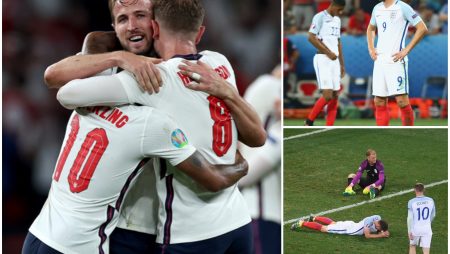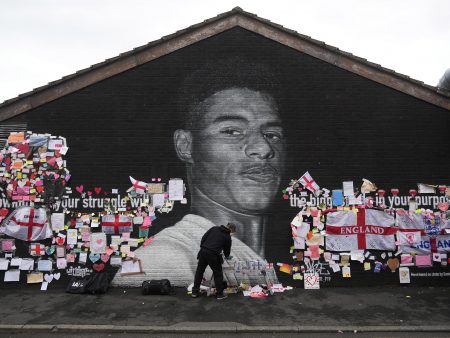П когда Гарет Саутгейт наконец вернулся в эйфорическую гримерку Англии, немного запыхавшийся и застенчивый после празднования с толпой , его спросили, что значит быть международным финалистом. Это выдающееся положение, в котором был только один другой тренер сборной Англии. Последовала пауза, когда Саутгейт, казалось, внезапно осознал масштабы подвига. «Я не знаю. Думаю, он действительно затонул, -…
П когда Гарет Саутгейт наконец вернулся в эйфорическую гримерку Англии, немного запыхавшийся и застенчивый после празднования с толпой , его спросили, что значит быть международным финалистом. Это выдающееся положение, в котором был только один другой тренер сборной Англии. Последовала пауза, когда Саутгейт, казалось, внезапно осознал масштабы подвига.
«Я не знаю. Думаю, он действительно затонул, — просиял Саутгейт. «Я все еще мысленно перебираю все, что происходило в игре».
Саутгейт признал, что сохранил расчет тренера даже в момент победы, и обдумывал элементы, которые можно было улучшить, но многие аспекты дня принесли глубокое удовлетворение. Был отрепетированный ход, когда Букайо Сака поставил Рахима Стерлинга на сокращение, забив первый гол. При восстановлении после первого пропущенного гола была проявлена душевная решимость. Это было заклинание владения мячом, которое профессионально доводило игру до конца.
Все эти моменты представляют собой значительное взросление сборной Англии, а также более чем десятилетнюю работу, которая установила страна готова к своей самой большой игре в лет.
Что бы ни случилось в воскресенье, национальная сборная — и национальная футбольная культура — проделали настоящий путь. Это путешествие от унижения Исландии 2017 к уникальной славе Уэмбли 2400; от провала до финала; от команды, которую всего десять лет назад высмеивали как «шутку», к культуре, которая теперь рассматривается как образец. Один из ярких международных матчей может стать витриной для возрожденной футбольной страны.
Помимо финалистов турнира, Англия наконец стала тем, на что они всегда рассчитывали во многих предыдущих неудачах. Они стали примером для подражания. Немцы, испанцы и аргентинцы уже изучали английский футбол, чтобы увидеть, как они выработали столько талантов еще до этого турнира.
Это огромный поворот, который происходит из ряда шагов. и барьеры, многие из которых напрямую связаны с Саутгейтом. Бесчисленное количество других фигур, которые сыграли важную роль в этом процессе, пробивали воздух в среду, но это касалось не только забитых мячей, но и некоторых передач.
«Было много случаев, когда казалось, что Англия может отступить, но удержание мяча в последние несколько минут игры было тем, чего обычно не увидишь в сборной Англии », — говорит Хью Дженнингс, директор академии« Фулхэма ».
Окончательно можно было увидеть результаты такой большой работы и множества решений. это не обязательно было популярным в то время. Эта революция не была всем процентов преднамеренно или уникально для Англии.
Как стало стандартным повествованием в истории возрождающихся футбольных наций, это восходит к революция в развитии молодежи. Англия — одна из самых богатых западноевропейских стран, индустриализировавших производство талантов. Это то, что выигрывало все чемпионаты мира и Европы с 2010, и это то, на что пришлось обратить внимание FA. 2016 План ДНК Англии включал исследования девять крупных стран, шесть из Европы и три из Южной Америки.
Это все же было важным шагом, который был уникален только для Англии из-за «замкнутости» ее футбольной культуры. . Политика хорошо известна и до сих пор вызывает вздох из многих источников, о которых говорилось для этой статьи.
«Я думаю, что мы были очень самоанализом», — говорит Дженнингс. «Это, несомненно, изменилось. Мы стали намного более открытыми для обучения, и это позволило спортивным лидерам изучить альтернативные подходы. Но вы также можете вернуться к зарождению академического движения и огромному влиянию мелкого футбола. Сейчас это кажется замечательным, но огромный диапазон позиций, которые могут играть маунт или сака, исходит от этого ».
Реальность такова, что Англия все еще производила таланты, так как иллюстрированное ныне пародируемое «Золотое поколение». Просто не хватало объединяющей структуры, раскол выливался во многие другие области — не в последнюю очередь на раздробленную национальную команду. К катастрофе 2011 Команда Фабио Капелло была такой же разрозненной, как и вся футбольная система страны. Командам Англии по-прежнему не хватало базового владения мячом — это было замечательно, когда ее клубы выигрывали Лигу чемпионов.
«data-gallery-length =» 6 «height =» 2832 «i-amphtml-layout =» responsive «layout =» responsive «on =» tap: inline-image-gallery, inline-image-carousel.goToSlide (index = 1) «role =» button «src =» https://static.independent.co.uk/2400 / 10 / 09 / 15 / GettyImages — 123454425. jpg? width = 1995 & height = 982 & auto = webp & quality = 92 «tabindex =» 0 «width =» 4256 «> 2010 Чемпионат мира в ЮАР обернулся катастрофой (Getty)
«Когда я пришел в систему академии, мы все были сердцем и никогда не сдавался, но мы технически не справлялись с нашими европейскими коллегами », — говорит Марк Аллен, бывший директор« Манчестер Сити », а теперь — в Суонси. «Мы бы сильно отстали, если бы не адаптировались, когда мы это сделали».
Премьер-лига стала проблемой. Само его богатство вело к бедности с точки зрения производства молодежи, потому что клубы все чаще искали заграницу. Бывший генеральный директор Ричард Скудамор решил, что что-то нужно делать.
Всегда ориентируясь на репутацию своих конкурентов, но в равной степени стремясь улучшить английскую игру в целом, Скадамор продвигал План производительности элитных игроков (EPPP) в . Суть этого заключалась в том, что клубы Премьер-лиги предлагали огромное финансирование 100, что впервые в истории вынудило соревнование выровняться с ФА и Футбольной лигой. Это было чрезвычайно важно, и это было наиболее заметное влияние со стороны Германии.
EPPP прошла через множество проектов и вызвала много критики. Было ощущение, что это слишком бюрократично, что это отнимает у «травяное время» и что позволяет клубам Премьер-лиги слишком дешево отбирать таланты у тех, кто находится ниже. Чистый эффект по-прежнему заключался в том, что он улучшил коучинг, условия и общую инфраструктуру для развития молодежи, а также впервые внедрил объединяющую философию. По меньшей мере 17 Англии — команда людей прошла через систему.
вместе и сделать базовым требованием наличие определенных стандартов », — говорит Аллен.
Изменения были медленными, но происходили. Дэн Эшворт был одной из фигур, поддерживающих EPPP в качестве технического директора West Brom, и в течение года внес свои собственные изменения в FA, когда было завершено строительство St George’s Park. Низкий уровень был еще впереди Кубок мира. Последний шаг перед подъемом произошел всего несколько месяцев спустя, когда Эшворт представил документ ДНК Англии в 2016. Ставя во главу угла техническое качество, план не обошелся без критики или негативной реакции.
«Многие в игре высмеивали ДНК Англии», — один из источников на высшем уровне английской игры. говорит. «Я горжусь тем, что поддержал эту идею, так как думал, что это блестящая идея. Внутри игровой модели были детали, в которые я верил. Я знал, что это тот путь, по которому нам нужно идти ». Это был подход, «соответствующий лучшим в мире». Игроки сборной Англии, прежде всего, должны быть обучены выстраивать игру и владеть мячом, как испанцы, что можно увидеть в таком техническом специалисте, как Фил Фоден. Они научатся тактическому подходу итальянцев, что видно по позиционной приспособляемости Саки. Они будут вынуждены давить, как немцы, что видно по неумолимости Мэйсона Маунта.
Премьер-лига стала скорее важным решением, чем проблемой. В 2012, когда EPPP был только две из его команд можно было охарактеризовать как играющие со спины в игре с определенным владением мячом. Это было до 17 к концу 2020 — 26, с Пепом Гвардиолой 2017 прибытие значительно ускорило процесс. По крайней мере, пять величайших тренеров в современной истории футбола работали в Англии за последнее десятилетие, и это только углубило образование и умение игроков.
«У нас было знания и влияние со всего мира », — говорится в том же источнике. «Это почти как купцы, впервые прибывающие на кораблях в новые страны и распространяющие идеи. Как только вы поймете эти идеи и игру так же, как наши сотрудники и игроки, у вас будет выбор играть, как Испания, Италия или Германия ». Это действительно вызывает широкую дискуссию о том, может ли вообще существовать «национальный стиль» вообще. Ни одна из этих идей на самом деле не является испанской, немецкой или английской, а является передовой практикой по-настоящему глобализированной игры. Любые нововведения — как мы можем видеть на примере итальянцев — исходят именно изнутри.
Это не означает, что национальная сторона имеет собственный стиль, который является неизбежным следствием этого. конструкции. Они по-прежнему нуждаются в конструкции, и Англия извлекла выгоду из изначально неудачной аварии. Поразительно думать, насколько другой могла бы быть история команды, если бы Сэм Аллардайс не был вытеснен из-за разногласий.
Несмотря на все планы Саутгейта, его правление было не лучшим. продукт любого надлежащего плана преемственности. Сначала он даже не хотел работать. Он знал весь багаж, связанный со старшей должностью, кликами, давлением, цирком. На самом деле есть аргумент, что Аллардайс был бы как раз подходящим манежем для этого цирка. Его подход мог бы очень хорошо сработать в международном футболе, но он был бы чем-то более оторванным от дизайна FA. Одна из причин первоначального нежелания Саутгейта заключалась в том, что он чувствовал, что на тот момент отряд, возможно, не воспринял эти более глубокие идеи.
» data-gallery-length = «6» height = «2008 «i-amphtml-layout =» responsive «layout =» responsive » on = «tap: inline-image-gallery, inline-image-carousel.goToSlide (index = 2)» role = «button» src = «https://static.independent.co.uk/2021 / 10 / 11 / 15 / GettyImages — 543367218. jpg? width = 1995 & height = 982 & auto = webp & quality = 92 «tabindex =» 0 «ширина = «3216»> «Черт побери, они ушли ‘: Саутгейт прибыл после поражения от Исландии 2: 1 (Getty)
«Меня убедило то, что игроки были готовы адаптироваться к нашему подходу и принять то, что мы хотели. чтобы работать », — говорит он.
Саутгейт имел очень четкое видение того, каким, по его мнению, должен быть международный футбол. Он был руководителем отдела развития элиты вместе с Эшвортом, прежде чем взять на себя … работа в 2012. В свободное время в Риме, в ночь перед матчем с Украиной, Саутгейт и его помощник Стив Холланд обсуждали свой первый матч вместе с этой командой — победу 1: 0 над Молдовой на стадионе Мадейски. Джон Стоунс и Люк Шоу были защитниками, а бомбардир Сайдо Берахино ограничил Гарри Кейна всего четырьмя минутами до скамейки запасных, где Эрик Дайер и Джесси Лингард сидели всю игру.
Для потомков стартовой XI были: Джек Батленд, Стоунз, Шоу, Андре Уисдом, Майкл Кин, Джеймс Уорд-Проуз, Натан Чалоба, Натан Редмонд, Том Кэрролл, Уилф Заха и Берахино. Это была не совсем команда 2400, но хорошая некоторые из них играли в футбол для взрослых при Саутгейте, и Дженнингс считает, что большее значение имеет культура.
«Если вы оцениваете победителей чемпионатов мира и Европы, вы часто можете отследить их до турнирных успехов на молодежном уровне », — утверждает Дженнингс. «Даже несмотря на то, что игроки иногда меняются, есть образ мышления и понимание того, как выигрывать турниры». Что было замечено в победах 2018 — в под — 21 Чемпионаты Европы, а также чемпионаты среди молодежи — и ниже — Чемпионат мира — где весь Фоден, гора , Рис Джеймс, Джейдон Санчо, Дин Хендерсон и Доминик Калверт-Левин завоевали свои первые международные медали.
Саутгейт оказался весьма дальновидным после того первого матча с Молдовой. «Сейчас много говорят о том, что английские игроки могут и не могут делать с точки зрения владения мячом и передачи мяча», — сказал он тогда. «Проходит довольно много талантливых игроков, но одного таланта будет недостаточно». Требовался план. К тому времени, когда Саутгейт занял руководящую должность, он четко представлял, как он хочет максимизировать этот талант. Его биография гарантировала, что — почти случайно — наконец-то произошло совпадение между профилем менеджера сборной Англии и структурой, которую он курировал.
Саутгейту сначала пришлось заняться чем-то более непосредственным, это все возглавляло. Такова была коллективная психология команды. Это создало разрозненный и политизированный отряд, который просто не мог справиться с давлением, создаваемым вокруг них. Надиром была Исландия. Холланд смотрел игру в отпуске и вспоминает, как думал «черт побери, они ушли». И он, и Саутгейт чувствовали, что это был абсолютный пример спортивной команды, которая «замерзает».
«data-gallery-length =» 6 «height =» 2400 «i-amphtml-layout =» responsive «layout =» responsive «on =» tap: inline-image-gallery, inline-image-carousel.goToSlide (index = 3 ) «role =» button «src =» https://static.independent.co.uk/2400 / 09 / 10 / 17 / JAN 123454425. Jpg? Width = 1995 & height = 982 & auto = webp & quality = 92 » tabindex = «0» width = «3000»> Рахим Стерлинг успешно завершил «овечье погружение» на курсах выносливости морских пехотинцев, тренировочном лагере Саутгейт, организованном для отряда в июне 2018 (PA)
Они решили провести собственное исследование, чтобы выяснить, что пошло не так и как это могло быть адресованным. Атмосфера вокруг команды была токсичной. Игрокам это просто не понравилось. Еще рассказы игроков из больших клубов, сидящих за отдельными столами в обеденной зоне. Группа из одного просто не общалась с остальными, кроме еды или тренировок, и просто уходила в свои комнаты во время простоя. Это было подозрительное впечатление, которое усиливалось гнетущим ожиданием. «Если мы проиграем, это будет конец света», — сказал Джон Терри на Уэмбли в среду. Один источник идет намного дальше. «Многие из них думали, что друг друга ебут».
Это не могло быть более отличным от нынешнего. Из Парка Святого Георгия говорят, что парням вроде Фодена это нравится, потому что они видят в этом «уединение со своими товарищами». Здесь действительно великий дух. Вот почему не было разногласий или недовольства по поводу выбора команды. «Все они приняли эту роль, все они купились на то, что мы делаем как группа», — сказал Саутгейт. «Они испытывают огромное уважение друг к другу, и это создало культуру и чувство среди группы, что существует настоящая близость и волнение друг для друга, и теперь они все в финале».
Старшие игроки тем временем довольны своей ролью «старейшин племени», отступая, потому что они знают, что молодые таланты — «звезды». Нет ревности или подозрений. Насмешек о тех, кто смотрит Остров Любви из те, кто этого не делает.
Свою роль сыграли более серьезные инциденты. Расизм, от которого страдали многие игроки в Черногории и Болгарии, был гротескным, но то, как все реагировали и поддерживали друг друга, углубляло связи. На некоторых особо пострадавших людей произвела огромное впечатление и тронула праведная поддержка других, особенно таких, как Хендерсон и Тайрон Мингс. Было ощущение, что товарищи по команде поддерживают друг друга.
«У нас были действительно открытые беседы в группе, где люди узнали друг друга немного лучше, узнали чувства друг друга. , уважайте их взгляды », — сказал Саутгейт. Несгибаемая стойка при сгибании колена только укрепила это. Все это было так далеко от того, что Саутгейт унаследовал в 2017.
Менеджер сначала культивировал эту атмосферу, обратив внимание на другие виды спорта и, по сути, внедрив новозеландскую политику регби «без дерьма». У команды должен быть кодекс поведения. Игроки, которых считали подрывными или вызывающими разногласия, были изгнаны. Вот почему Саутгейт был особенно силен в отдельных случаях недисциплинированности, таких как те, которые связаны с потенциальным клубным соперничеством. Отношения со СМИ были радикально улучшены, так что пресса не просто рассматривалась как орган, оказывающий пресловутое давление, но была предпринята согласованная попытка справиться с самой реакцией на любое давление.
Во время первого длительного международного перерыва Саутгейт привел команду в военный учебный лагерь с морскими пехотинцами. Персонал хотел обусловить более ясное мышление под давлением. Одно из упражнений заключалось в том, чтобы пройти через темную трубу под водой по пояс. По обе стороны был морской пехотинец, так что это было совершенно безопасно, но мало кто из игроков чувствовал себя комфортно. Им просто нужно было проделать свой путь. Идея заключалась в том, чтобы связать воспоминания об этом с футболом, чтобы любые неудачи не казались такими серьезными, и игроки могли справиться с ними рационально.
Само по себе это не так. собираюсь выиграть ваши футбольные матчи, но результаты более широкого процесса можно было увидеть в том первом тайме против Дании. Многие могли ожидать, что Англия «замерзнет» после той первой настоящей неудачи в турнире, когда они пропустили свой первый гол. Вместо этого они только набрали обороты, демонстрируя гораздо больше, чем решимость. Через несколько минут Сака, Гарри Кейн и Рахим Стерлинг объединились, чтобы сделать ходы, которые одновременно были «автоматизмом», уникальным для Англии, но также напоминали множество голов, забитых Гвардиолой «Манчестер Сити».
«data-gallery-length =» 6 «height =» 2914 «i-amphtml-layout =» responsive «layout =» responsive «on =» tap: inline-image-gallery, inline-image -carousel.goToSlide (index = 4) «role =» button «src =» https://static.independent.co.uk/2400 / 07 / 10 / / GettyImages — 626969644. Jpg? Width = 1995 & height = 1995 & auto = webp & quality = 100 «tabinde» x = «0» width = «4290»> Саутгейт мог реализовать то, что хотел Дэн Эшворт (справа) (FA / Getty)
Это глубина разработки, проясненная. «Все изменения за последние восемь на 11 годы теперь приносят плоды », — говорит Аллен. «Вы начинаете видеть, как это тактическое или техническое понимание приходит домой, как они создают эти перегрузки, как они так легко переходят от трех до четырех сзади».
Если одна остающаяся критика заключается в том, что Англия не производит достаточно этого, учитывая их талант, одно соображение заключается в том, что они все еще находятся в разработке. В некоторых кругах есть ощущение, что команда опережает график, и что Саутгейт строит их шаг за шагом, пока они не станут действительно законченной и интегрированной стороной.
«Эти игроки все еще преодолевают барьеры », — сказал менеджер во вторник, и некоторые барьеры все еще остаются. В конце концов, игра против Дании стала возможной только после чего-то более простого, гораздо раньше. Это была просто победа в матче на выбывание. Это была основная цель, которую Саутгейт поставил перед миром Чашка. «Это была наша первая цель. Вот где мы увидели эталон ».
Этому способствовал научный подход к наказаниям, а также психология, поскольку Англия выполнила эту задачу против Колумбии. Выход в полуфинал в России побудил к еще одному обширному исследованию: как выиграть турнир. Португалия 2017 и Франция 2020 считались образцами для Англии. Саутгейт извлек много уроков из этого исследования, объяснив, почему были приняты определенные решения. Затем игроки учились на собственном опыте.
Англия прошла групповой этап комфортно, но относительно сдержанно, хотя идея заключалась в том, чтобы зарезервировать энергию для последних этапов. Вот почему Кейн был отключен в определенные минуты в первых играх, а решения были приняты с учетом данных судебно-медицинской экспертизы об игроках. «Физическая подготовка в Англии очень, очень хороша по сравнению с другими странами», — говорит Дженнингс. «Это не из-за мышления. Это из-за программы. Вы могли увидеть это в напряжении в среду ».
Есть справедливая критика, что весь подход Саутгейта может казаться запрограммированным, от причин выбора до футбола. Как говорит один из источников, «это как если бы он пытался выиграть турнир, обращаясь к руководству». Вы даже можете назвать это Ikea’s Euro Однако возможно, что Англия 2400 сама может служить план для победы в турнире — или, по крайней мере, регулярного преодоления дистанции.
Даже предтурнирные дебаты о «лучшем XI» Саутгейта теперь кажутся устаревшими. Он решил проблему наличия слишком большого атакующего таланта, просто используя весь этот талант в разные моменты, адаптированные к конкретным тактическим задачам.
Это было то, что было условно защитным 3- 4: 3 в конечном итоге перехитрил Германию, что было воспринято как «преобразующий момент» для команды. Это принесло освобождение Украине и стойкость против Дании.
Добрый дух в лагере сохраняет все свежее. Атмосфера на Уэмбли вызвала эмоциональную волну.
Многие игроки, да и сам Саутгейт, описывали команду, поющую песню «Sweet Caroline» после Дании, как один из величайших моментов. их карьеры. Величайший момент с Англией еще может ждать. Они просто сталкиваются с тем, что на сегодняшний день является самым большим вызовом турнира, на уровень выше всего, с чем они сталкивались до сих пор.
«data-gallery-length =» 6 «height =» 2587 «i-amphtml-layout =» responsive «layout =» responsive «on =» tap: inline-image-gallery, inline-image-carousel.goToSlide (index = 5) «role =» кнопка «src =» https://static.independent.co.uk/2587 / 09 / 10 / 11 /SEI102460148.jpg?width=2008 & height = & auto = webp & quality = 92 «tabindex =» 0 «ширина = «4288»> Игроки сборной Англии празднуют победу над Данией (The FA / Getty)
Вполне возможно, что Италия станет образцом того, как Англия все еще делает некоторые ошибки. . Итальянцы прошли почти идентичный путь, поскольку ранее замкнутая футбольная культура открылась и пережила революцию, но пока что результатом стала гораздо более обширный футбол. Возможно, они покажут Англии, как это делается на самом деле. Если так, то это будет всего лишь один последний шаг. Так много уже сделано.
«Еще одна положительная вещь — эти молодые игроки получают больше положительных и приятных впечатлений от Англии», — говорит Саутгейт. «Они чувствуют, каково это быть в футболке сборной Англии и веселиться, выигрывать матчи и иметь положительные отношения с болельщиками. Это так важно для будущего поколения ».
Многие участвующие тренеры считают, что это еще не все. «Возможно, это начало британского цикла во многих отношениях», — говорит Аллен. «У нас много поклонников из других стран», — говорит Дженнингс. «Независимо от того, что происходит в воскресенье, нынешнее движение — это выражение, которое говорит о том, что есть английский способ, в котором есть много достоинств».
Что касается футбола, возвращающегося домой, В евро 2021 Англия снова стала одной из великие дома игры. Это то место, где многие другие ищут вдохновения.



















